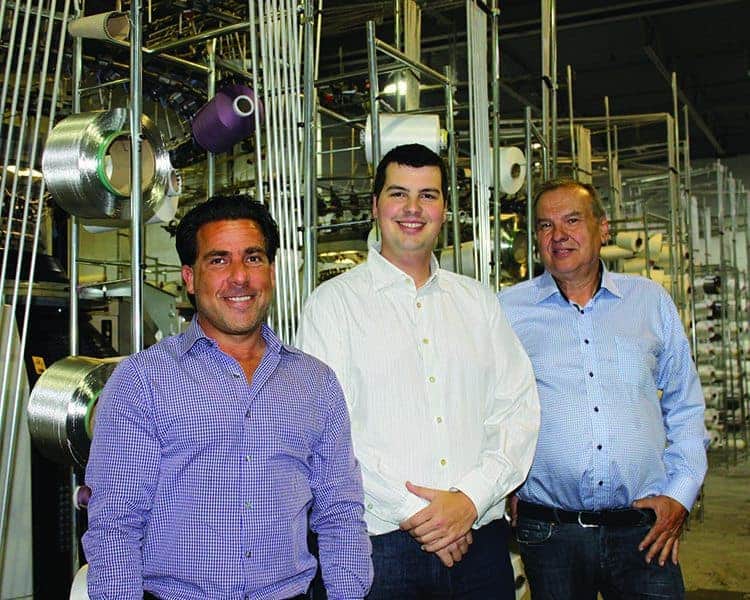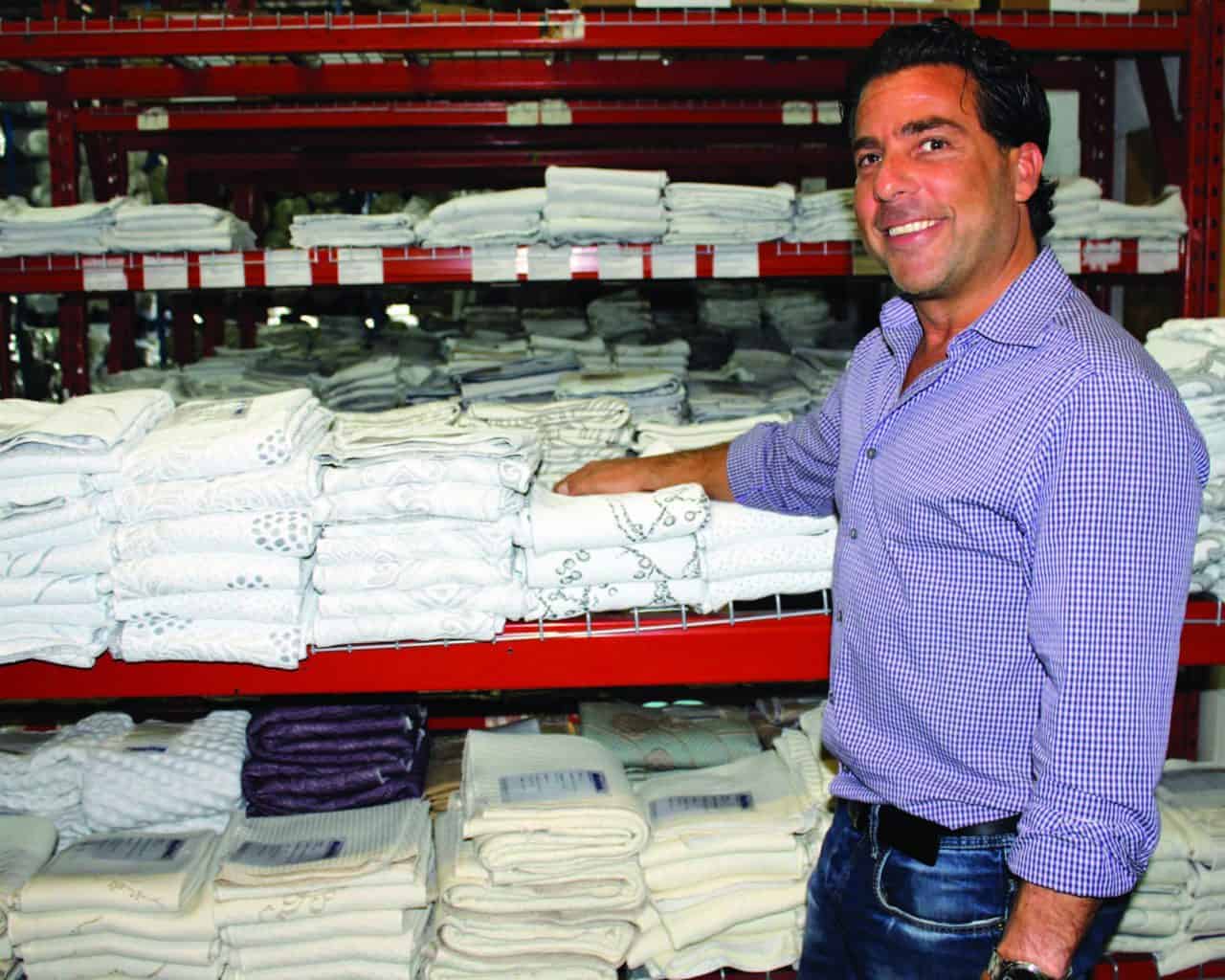
Lorne Romoff, (from left) vice president of sales and marketing, joined the family-owned company as it was transitioning away from apparel. The business is led by Maxime Theriault, vice president of commercial operations, and Denis Theriault, founder and president.
BY DOROTHY WHITCOMB
By shifting its focus from producing textiles for the apparel industry to providing fabrics for bedding, Maxime Knitting Mills Inc. has transformed itself from a threatened company to one that is vibrant and growth-oriented.
Company executives credit a culture grounded in creativity, service and quality—plus hard work—for the renaissance of the once-moribund company. As they look to the future, they are relying on the reputation they have built in Canada and the United States to propel growth in other regions.
The corporate transformation began six years ago, when Denis Theriault, Maxime Knitting president, realized that his company had reached a crossroads.
When he founded the Montreal-based textile mill in 1985, Canada’s apparel industry was strong. But as more and more textile mills and apparel manufacturers left to take advantage of lower labor costs in Asia and Mexico, Maxime Knitting’s sales eroded. The company couldn’t compete with lower prices offered by other producers.
Making the move to mattresses
Theriault, who started his business after working for years as a mechanic in another textile mill, saw Canada’s mattress industry as a potentially more lucrative market and asked Lorne Romoff, a former competitor, to lead his company’s transition.
Romoff had run his own knitting company in Montreal for 17 years before closing it in the face of the same pressures Theriault was experiencing. Both men understood the challenges they were facing.

Lorne Romoff, vice president of sales and marketing, shows off Maxime Knitting Mills Inc.’s wide selection of mattress fabrics.
“When we entered the bedding industry six years ago, it was a real David and Goliath situation,” says Romoff, who is now vice president of sales and marketing for Maxime Knitting. “Although there were only five domestic knitters at the time, all were gigantic and had been in business for over 50 years.”
Romoff adds: “The only thing we knew was how to knit goods. Knitting was the easy part. Our biggest problem was not even knowing what the bedding industry needed and then convincing potential customers that we could meet their needs.”
For instance, mattress industry production strategies, such as just-in-time delivery, weren’t second nature to Maxime Knitting.
“We couldn’t figure out why people wanted to order three times a week,” Romoff says.
The executives did know, however, that there were some inherent advantages to being a Canadian mill that, at the time, was selling only to Canadian manufacturers.
“We marketed ourselves that way,” Romoff says.
Maxime Knitting came to understand the bedding business and mattress manufacturers learned that by ordering from the company they could “order on the fly, manage inventory better, reduce transportation costs, and eliminate currency conversion and duty costs,” Romoff says.
Maxime Theriault, vice president of commercial operations, and Denis Theriault’s son, believes that being based in Montreal also gave the company an added advantage.
“Montreal’s design community is very fashion-forward and that’s a huge advantage for our company,” he says. “It gives us a leg up because we can offer avant-garde designs that distinguish us from our competitors.”
Sealy Canada was the first mattress manufacturer to sign on with the transformed company. Today, Maxime Knitting has 104 accounts in the country.
Building on a corporate culture
Maxime Theriault credits the company’s team-based culture for much of its success. That culture—and the reputation that it helped build—enabled the company to successfully enter the U.S. market 3 ½ years ago.
“We’re a family business, not a multinational, and we have people who have been working here for 20 years,” he says. “We try to be humble and to have a direct relationship with our customers. We take a lot of pride in what we do and everyone is part of a team working to make sure that what we offer is the best.” (Helene Massicotte, Maxime Theriault’s mother and Denis Theriault’s wife, also works in business as vice president of finance.)
The company’s 125,000-square-foot headquarters, which includes production facilities, administrative offices, a showroom and a warehouse, fosters Maxime Knitting’s commitment to teamwork.
“Everything is under the same roof and it’s a very open environment,” Maxime Theriault says. “It’s a very dynamic environment that was designed to ensure communication. Our offices are actually just a big open space and we try to work together so that we can move quickly.”
Customer service is a cornerstone of the company’s success.
“Getting the job done for the customer is the most important thing,” Romoff says. “If a customer needs a 20-yard cut immediately, I’ll stop the machine and do it for them.”
Maxime Theriault lauds the work of the company’s customer service staff.
“Their job is to make sure that customers are happy,” he says. “If there is a question from a customer, it has to be returned within 30 minutes.”
Heading south
Maxime Knitting currently employs 65 people. Last year, the company added 10 staffers, including four independent sales representatives based in the United States.
When company leaders made the decision to enter the U.S. market, they knew they were facing another David and Goliath situation.
“We were no longer playing on the home field and the competition was entrenched,” Romoff says. “We started slowly in the United States, concentrating on smaller to medium-size accounts that weren’t getting a lot of attention because of their size. We capitalized on what we could control, like service. Everybody needs affection, whether they’re buying 100 yards or 1,000 yards.”
Romoff told his sales reps: “Don’t use your feet; use your head.” He wants each new account to work in partnership with the knitting company, growing both of their businesses in the process.
To better serve U.S. accounts, the company has leased an 80,000-square-foot warehouse in Stoneville, N.C., where it inventories about 100,000 square yards of fabric.
“We turn quicker than most of our competition,” Romoff says.
The company’s expansion strategy has worked, growing from 20 U.S. accounts to 136 accounts in 36 months. The additional business has put the knitting mill into overdrive: Six years ago, it operated three knitting machines. Today, it runs 33 machines during three shifts, seven days a week.
The influx of business from U.S. bedding manufacturers has boosted overall annual sales by about 30% a year for the past three years, according to Maxime Theriault.
“We understand that growing by 30% every year is difficult and we’re trying to stabilize that growth to about 10% to 15% annually,” he adds.
The company’s next major expansion will come in South America.
“We’ve been working with distributors there for a while, but plan to expand those efforts in the next 12 months,” Romoff says. The company also sells directly to bedding manufacturers in Australia and China that Maxime Knitting executives met while exhibiting at ISPA EXPO shows in 2010 and 2012.
Meeting customer expectations
Since entering the mattress market, the company’s goal has been to provide customers with innovative fabric choices that meet a broad range of needs.
Maxime Knitting’s line includes 200 headers, which are “tweaked quarterly so that customers always have new things to look at,” Romoff says. Products include fabrics made from cotton and recycled polyester, as well as rayon derived from bamboo. Specialty offerings range from super-stretch knits to “blister” constructions with 3-D effects to fabric treatments such as aloe vera and temperature-regulating Outlast.
Maxime Theriault believes that customers hold the company to a high standard and he is pleased that they do.
“They expect us to be innovative and different from everyone else,” he says. “That’s a lot of pressure, but that’s OK. It pushes us, and that’s what you have to do to grow.”
While the company currently knits with “every type of yarn and offers all finishes,” Romoff says, customers are pushing Maxime Knitting to meet other needs.
“They want us to offer a full package of import, novelty and added-value fabrics that can be used as side panels,” he says. “They want us to do everything that our competition is doing so that they have the option of buying it all from us.”
Making that happen will be “the focus of a lot of energy here in the next 24 months,” Romoff adds.
The next two years are likely to bring some management changes to Maxime Knitting, as well. Transition planning is under way for Denis Theriault’s retirement, when Maxime Theriault will take over as president.
No worries: This is a company that thrives on change.
“We’re very flexible and we’re trying to be more aggressive so that we make sure that we always offer new things that our competition can’t,” Maxime Theriault says.
| BRIEFLY | |
| Company | Maxime Knitting Mills Inc. |
| Specialty | Residential and contract pocket-spring bedding |
| Headquarters | Montreal |
| Specialty | Knit mattress fabrics |
| Founded | Started by Denis Theriault in 1985 |
| Ownership | Privately held, family-owned |
| Learn more | www.tricotsmaxime.com |




